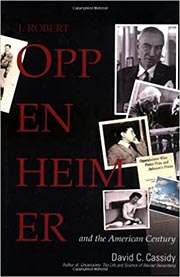J. Robert Oppenheimer: And the American Century
by David C. Cassidy
Reviewed October 19, 2004
 The life of J. Robert Oppenheimer is one of great mystery and fascination. His role in the development of the atomic bomb and his subsequent role in shaping America's nuclear policy, as well as his rise and fall during McCarthy has been the subject of countless books. David Cassidy, Hofstra University professor, has written an excellent account of Oppenheimer's life and the development of theoretical physics in America during the early part of the 20th century. The parallelism between the life of Oppenheimer and the rise of American science is an intriguing tale that is captured in this book.
The life of J. Robert Oppenheimer is one of great mystery and fascination. His role in the development of the atomic bomb and his subsequent role in shaping America's nuclear policy, as well as his rise and fall during McCarthy has been the subject of countless books. David Cassidy, Hofstra University professor, has written an excellent account of Oppenheimer's life and the development of theoretical physics in America during the early part of the 20th century. The parallelism between the life of Oppenheimer and the rise of American science is an intriguing tale that is captured in this book.
This biography is a detailed and beautifully written work. Cassidy expands beyond the traditional scope of a biography and expertly explores the surrounding environment that shaped Oppenheimer's life. He draws upon previously untapped primary documents, and shows the importance and character of Oppenheimer's early education on the rest of his life. Cassidy examines the conflicts between Oppenheimer's liberal education from the Ethical Culture School and the culture that he found at Harvard. Oppenheimer's time in Europe is also recounted.
The book does not become overly focused on the Manhattan Project, but covers the time on "The Hill"in enough detail to keep the story in context. He instead offers insights to the periods before the war, when Oppenheimer taught at Berkeley and Cal Tech. Oppenheimer's genius and ability to inspire his students is shown, allowing us to gain insight into the man before the events that would be the foundation of his legacy.
The 1954 Atomic Energy Commission security review that disgraced Oppenheimer, and stripped him of his security clearance for alleged "red ties," are explored with the same thoughtful insight. Recent documents and information regarding those events are thoroughly and conclusively discussed.
Oppenheimer: and the American Century is a welcome addition to the history of science.